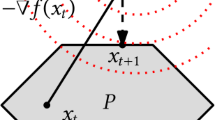Abstract
We develop a theoretical analysis of the performance of the regularized least-square algorithm on a reproducing kernel Hilbert space in the supervised learning setting. The presented results hold in the general framework of vector-valued functions; therefore they can be applied to multitask problems. In particular, we observe that the concept of effective dimension plays a central role in the definition of a criterion for the choice of the regularization parameter as a function of the number of samples. Moreover, a complete minimax analysis of the problem is described, showing that the convergence rates obtained by regularized least-squares estimators are indeed optimal over a suitable class of priors defined by the considered kernel. Finally, we give an improved lower rate result describing worst asymptotic behavior on individual probability measures rather than over classes of priors.
Similar content being viewed by others
Author information
Authors and Affiliations
Corresponding authors
Rights and permissions
About this article
Cite this article
Caponnetto, A., De Vito, E. Optimal Rates for the Regularized Least-Squares Algorithm. Found Comput Math 7, 331–368 (2007). https://doi.org/10.1007/s10208-006-0196-8
Received:
Accepted:
Published:
Issue Date:
DOI: https://doi.org/10.1007/s10208-006-0196-8




